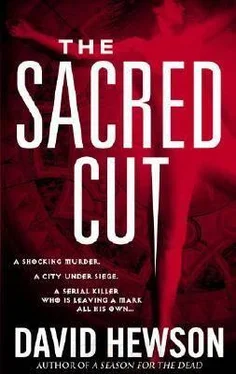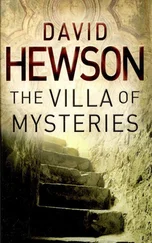The fabric lay coiled like a tiny serpent inside the evidence bag.
“That’s the thing he used?” Falcone asked. “It’s a cord?”
“It looks like a cord,” Teresa replied, then took out the fabric and, with two sets of tweezers, carefully unrolled it. “Until you take it apart a little.”
Falcone blinked at the object unfurling under her precise fingers.
It was dark grey and green, an odd patchwork that had been tightly rolled into the ligature which had killed the woman.
“Recognize the shape?” Teresa pulled the fabric tightly to make her point.
It was the Maltese cross pattern from Emily Deacon’s sacred cut. As near as dammit.
“He cut it out of a piece of fabric and then used it to kill her?” Falcone asked, bewildered.
“That’s one explanation. This is very tough fabric, though, and it seems manufactured to me. I’ve asked forensic to take a look.”
Falcone scowled. “I don’t see where that gets us.”
“Patience, Leo. So what about this?”
Falcone looked at a familiar sight: a sample of hair in a transparent morgue bag.
“This is from Margaret Kearney’s head,” she explained. “Black as coal, as you can see.”
He nodded, not understanding the point.
“You’re a gentleman, Leo. I’ll say that for you. The poor cow was stone dead on the floor there and you didn’t even take a good look down below, did you? This is not her natural hair colour. This”-she held up the second slide. A hank of light brown hair lay trapped between the pieces of glass-“is what her head’s supposed to look like. We took out the dye just to make sure. You can’t rely on what the pubic zone tells you. This is a general observation that goes beyond the matter of body hair, by the way. I trust you and Silvio will take it to heart.”
Falcone sighed and glanced at the clock on the wall. It was now nearly nine. “So you think she had a bullet wound. He killed her with some crazy piece of cloth. And you know she dyed her hair.”
“Oh, Leo, Leo,” she protested, “you really know nothing about women, do you? Naturally, her hair was a pleasant brown. Personally, I would have been quite happy with it. See?”
She waved her own lank crop at him. “What colour’s this?”
“Black,” he replied.
“No, no, no! How can a man like you, someone who’s usually so observant, be so blind? It’s really a very dark brown. Genuine black, the colour you have here”-she held up the second slide-“that’s quite rare naturally.”
He opened his hands in an expression of bafflement.
“Look,” she continued, “a woman who had black hair to begin with and went grey might dye it black. The rest of us? Check out the statistics with the hair-dye manufacturers. I have. A lot of women dye their hair blonde because that’s what gentlemen prefer, right? A good number like something chestnut or so, too. Think about it. Have you ever met a woman with nice chestnut hair who had an urge to dye it jet black? OK. You’re struggling to find the experience to answer that question. Let me do it for you. No. It doesn’t happen. It’s weird. It doesn’t compute. Black, real black like this, is something you get handed down in the genes. You learn to live with it. Maybe you learn to get rid of it. What you don’t do is make it happen if it wasn’t there in the first place.”
“That’s it?” he asked. “Maybe a bullet wound? Maybe an inexplicable use of hair dye?”
Silvio groaned. They both knew what Falcone was doing. Daring her to come up with something else. However she happened to have acquired it.
“No. That isn’t it. Silvio?”
“Oh, Jesus.” Di Capua walked towards the deep cabinet drawers where they stored everything that came attached to a death, however ordinary, however apparently meaningless. “Jesus, sweet Jesus. Here comes the shit again, here come the written warnings. Why can I not work with normal people? Why can I not-”
“Shut up!” she yelled.
He picked out a green plastic box, brought it over and placed the thing on the table. The name “Margaret Kearney” was handwritten on a label stuck to the front. Inside were a pile of neatly stashed clothing, a bag and several plastic folders full of personal belongings.
Falcone did a double take looking at it. Finally he said, “The cord I can go along with. Now tell me this isn’t what I think.”
“It’s her stuff, Leo. Hell, if I can’t have her surely I can have her stuff, can’t I?”
“I made it absolutely plain. Leapman had that piece of paper that gave him full authority-”
She was quick to interrupt. “Just a minute. You weren’t there when that team of dumbos he’d hired turned up with the hearse. ”We’re here for the body,“ they said. Well, that’s what they got. I even let them take our gurney. Do you have any idea what those things cost? I’ll be billing the White House personally if we don’t get it back.”
He put a hand on the green box. “This…”
“This is something they never asked for. Will they? Sure, once someone realizes what a stupid mistake they made. And they can have it. I won’t stand in their way. But tell me, Leo. What was I supposed to do? Run after them and say, ”I think you forgot something?“ Or leave it there in the Pantheon, for God’s sake?”
Something extraordinary happened then. Leo Falcone’s shoulders heaved an inch or two. Teresa Lupo realized she was witnessing him laugh, an event which was entirely new to her.
“I’m just a bystander in all this, aren’t I?” he asked finally, then fixed her with a hungry stare. “So?”
“So this.”
She pulled out Margaret Kearney’s US passport and showed him the photo. “Notice how very black her hair is there? How stiff the pose? She didn’t get this done in some supermarket booth, now, did she? I hate passport photos where people are actually thinking about what they look like. It’s so unnatural.”
“And?”
She pointed to the picture. “Note the glasses.” Then she picked up a plastic bag containing a pair of spectacles and began opening it. “These. Don’t worry. We’ve checked for prints. Nothing. No prints anywhere, as far as we can tell. Like the Americans said, this creep is good. Here-try them. Tell me what you see.”
Falcone glowered at the spectacles in her hand. “I don’t wear glasses.”
“Try them, Leo!” she ordered.
He did as he was told and put on the plain black-plastic glasses.
“I don’t see anything.”
“Not fuzzy? No different from normal?”
Falcone removed them and she could see he was starting to get interested now.
“Exactly.”
“No reason it should be. Those are plain glass. They’re not corrective at all.”
And she wondered: would he run straight back to the Americans with this information? Or would he mull it over first? She couldn’t take the risk, even if it did mean he just might go ballistic when he discovered what else she had done. There was an easy way to find out, too.
“One final thing,” she added. “ ”Margaret Kearney.“ There’s an address on her driver’s licence. Leapman and his friends said they’d be contacting relatives, right?”
“They said that,” Falcone agreed.
“The Internet’s a wonderful thing, you know. Tell him, Silvio.”
Di Capua stared at his shiny boots and said in a very low, timorous voice, “There’s no Margaret Kearney in the Manhattan phone book.”
“What?” Falcone yelled.
“There’s no phone number listed,” Di Capua continued. “She could be ex-directory, of course. Except the residential address isn’t an apartment either. It’s just a forwarding service.”
“You’ve been looking up this woman on the Internet?” Falcone bellowed. “This is a morgue. We get paid to do that kind of thing. What the hell gives you the right to interfere with our work like this? Again?”
Читать дальше










